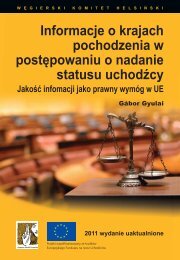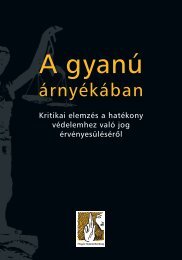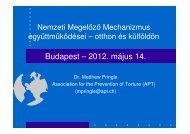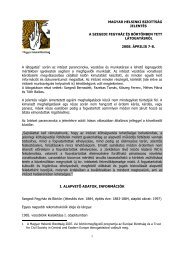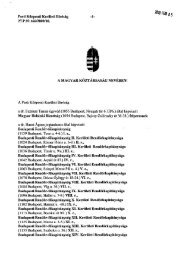English
English
English
Create successful ePaper yourself
Turn your PDF publications into a flip-book with our unique Google optimized e-Paper software.
Standard 3 Accurate Research and Selection of Up-to-date Information[...] the situation of the asylum-seeker in his country of origin has to be assessed objectively,because otherwise there is a procedural fault [...]. First of all, it is not permitted to proceed insuch a way that only those facts and findings from the reports are taken into account whichcorrespond to the final decision of the administrative body. In the present case, the SupremeAdministrative Court found that the method of using the information on the country oforigin was not objective, because the claimant selectively pointed out only certain areas of theclaim and did not deal with the other information relevant in this case. [...][...] in the opinion of the Supreme Administrative Court, [the authority used COI] in aselective way, since it left aside fundamental information [...]The same standard was later reinforced in CZ-26 and CZ-27.Romanian jurisprudence has also repeatedly criticised (RO-02, RO-03) thatThe interpretation of COI is obviously made in a truncated manner and out of context.and used this as an argument to squash administrative decisions. According to theRegional Administrative Court of Warsaw, Poland, the fact that the first-instanceauthority failed to consider and attach to the file a relevant part of a report otherwisewidely considered in the given case (PL-12):[...] not only gives rise to serious doubts as to the correctness of the conclusions made by theauthority and makes the decision uncontrollable by the Court, but it also renders justifiablethe applicant’s allegation that the authority used the given report in a selective way.Judgment AT-20 of the Administrative Court of Austria criticises a clear example ofintentionally distorted COI:The r eport on female genital mutilation (FGM) was cited within the explanatory statementof the second instance: “The police are willing to and have cooperated to stop this practicefrom happening”, however the subsequent part of the sentence describing the absence of stateprotection in various parts of the country was omitted. The original sentence reads as: “Thepolice are willing to and have cooperated to stop this practice from happening, but the abilityof the police to step up in remote communities in a timely and effective manner is severelylimited.”The Belgian Permanent Refugee Appeal Board talked in BE-04 about an “abusivereading” of sources, while the Sofia City Administrative Court in Bulgaria criticisedthe “selective and inaccurate” quoting of COI in BG-04. The High Court of Irelandapproached the issue of undesirable selective quotation from a different angle:In a situation where [...] there is a significant volume of country of origin information, itis possible by selective quotations to find support for any proposition. For this reason it isimportant to consider the country of origin information as a whole and to have regard to thegeneral principle or thrust of it.In IE-19 the High Court emphasised the difference between the liberty to weighevidence and the arbitrary selection of country information:While this court accepts that it was entirely up to the Refugee Appeals Tribunal to determinethe weight (if any) to be attached to any particular piece of country of origin information itwas not up to the Tribunal to arbitrarily prefer one piece of country of origin information overanother.55



